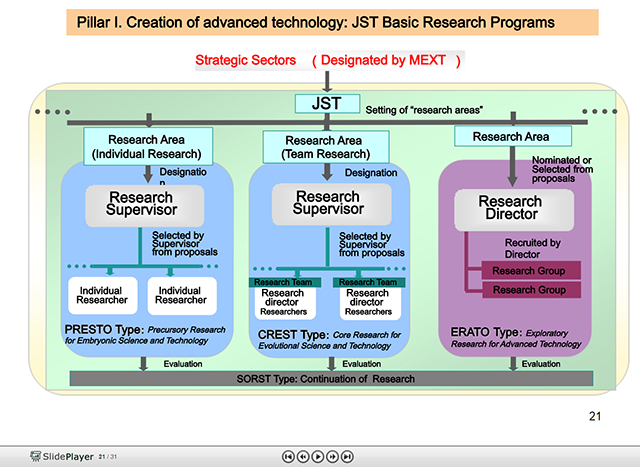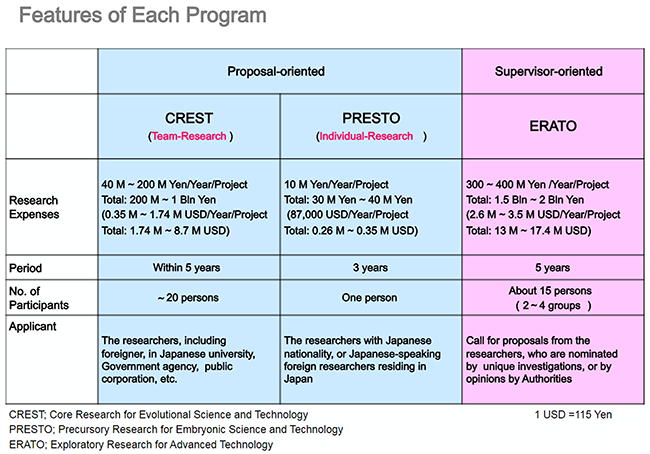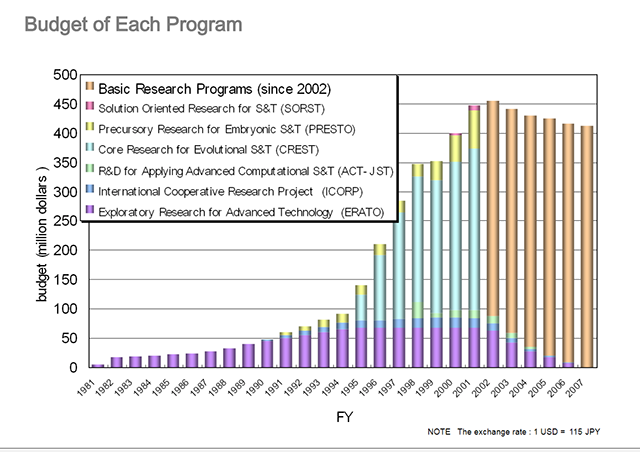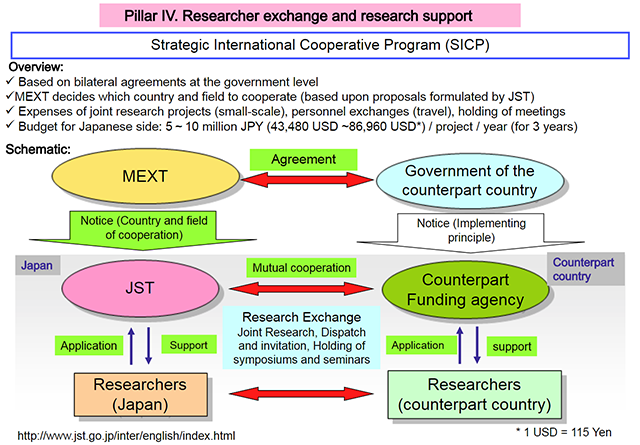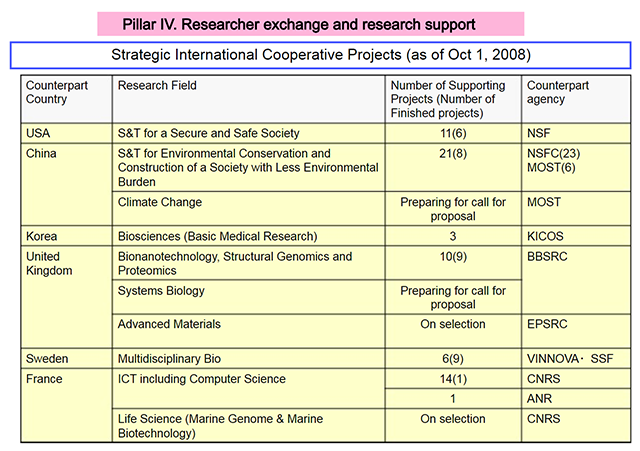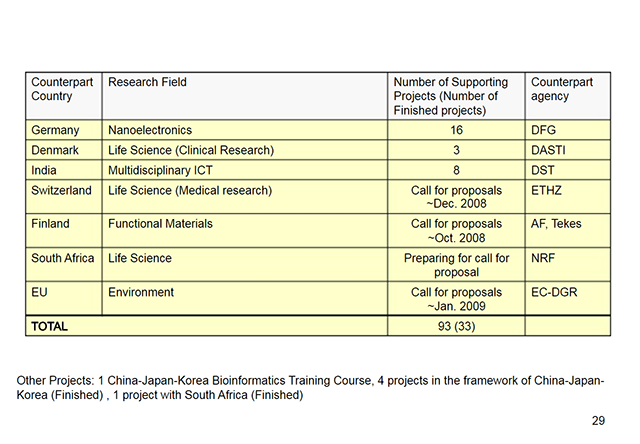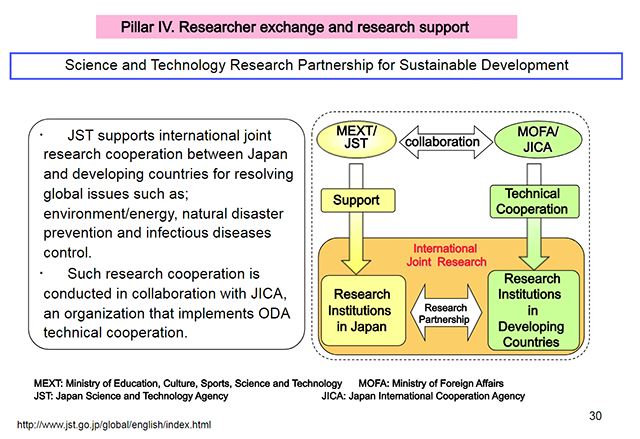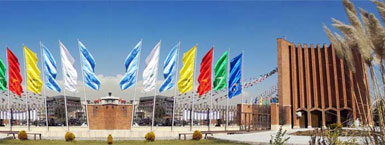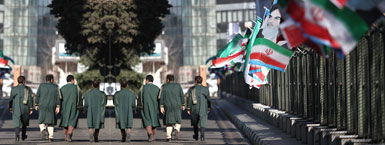JST
1. About JST (Japan Science and Technology Agency) Japan Science and Technology Agency (JST) aims to establish Japan as a nation built on the creativity of science and technology, as a core organization for implementing Japans science and technology policy in line with the objectives of the Science and Technology Basic Plan. 2. Funding Programs Core Research for Evolutional Science and Technology (CREST) https://www.jst.go.jp/kisoken/crest/en/about/index.html CREST is one of JST?s major undertakings for stimulating achievement in fundamental science fields. In addition, returning the fruits of such research to society through innovations is another important responsibility of JST. CREST is JSTs flagship funding program which has supported top scientists leading teams of researchers in politically prioritized, strategic and innovative areas such as green innovation, life innovation, ICT, etc., with the aim of achieving innovations with big impact. The budget of CREST per project is approximately 1.9 to 6.3 million USD per year for 5 years and project funding is awarded through a strict process of fair competitive selection. Precursory Research for Embryonic Science and Technology (PRESTO) https://www.jst.go.jp/kisoken/presto/en/about/index.html PRESTO aims to promote fundamental research in fields where a strategic focus has been placed, as a part of a system that promotes innovations leading to social and economic revolution, as well as generating new innovative technology that leads to the development of scientific technology and the creation of new industries. In PRESTO, under the management of Research Supervisors, JST promotes the independent research of individuals through advice from a Research Supervisor and Area Advisors, providing an environment for exchanging ideas among various institutions and researchers involved in the same field of research. The budget of PRESTO per project is approximately 380 to 500 thousand USD per year for 3 years, or 625 to 1300 thousand USD per year for 5 years. There are more than 700 projects on-going (as of 2012). Strategic International Research Cooperative Program (SICP) http://www.jst.go.jp/inter/english/project/purpose.html SICP provides research fund for projects selected through an open call for proposals with a counterpart funding agency (FA). The typicalmodel financial support scale is about 150 thousand USD for 3 years to Japanese side, and the equivalent level of support will be funded to counterpart research institutions by the counterpart FA. JST works in close cooperation with its counterpart FAs to operate the program and organize workshops and so forth to promote international collaboration. SICP also includes a sub-program, called "J-Rapid", to support international collaborative research/survey activities corresponding to natural or anthropogenic disasters, or other unanticipated events in the world. Strategic International Collaborative Research Program (SICORP) http://www.jst.go.jp/inter/english/index.html SICORP provides a larger scale of research fund to projects selected through open call. The financial support scale of about JPY 50-100 million is granted on Japanese side per project per year, for 3-5 years. The equivalent level of support will be funded to counterpart research institutions by the counterpart FAs. JST operation of this program is implemented under the supervision of Program Director (PD) and Program Officer (PO). Operating Funds
e-ASIA JRP SATREPS (Science and Technology Research Partnership for Sustainable Development)
SATREPS is a Japanese government program that promotes international joint research targeting global issues. Global challenges cannot be met by a single country or region acting on its own, so engagement by the international community is essential. To address these issues, SATREPS works through 3-to-5-year projects involving partnerships between researchers in Japan and researchers in developing countries. SATREPS projects are expected to lead to outcomes with potential for practical utilization, and to enhance research capacity in the developing country. The program is a collaboration between two Japanese government agencies: the Japan Science and Technology Agency (JST) New window and the Japan International Cooperation Agency (JICA) New window.
Fig. 1 JST program for research funding
Fig. 2 Feature of each funding program Fig. 3 depicts the budget of each JST funding programs.
Fig. 3 Budget of JST funding programs Fig. 4 shows the JST?s strategic international cooperative program (SICP)
Fig. 4 Strategic international cooperative program (SICP) Tables 1 and 2 depict some examples of JST?s strategic international programs. Table 1. JST?s SICP examples
Table 2. JST?s SICP examples
Fig. 5 illustrates science and technology research partnership for sustainable development.
|


